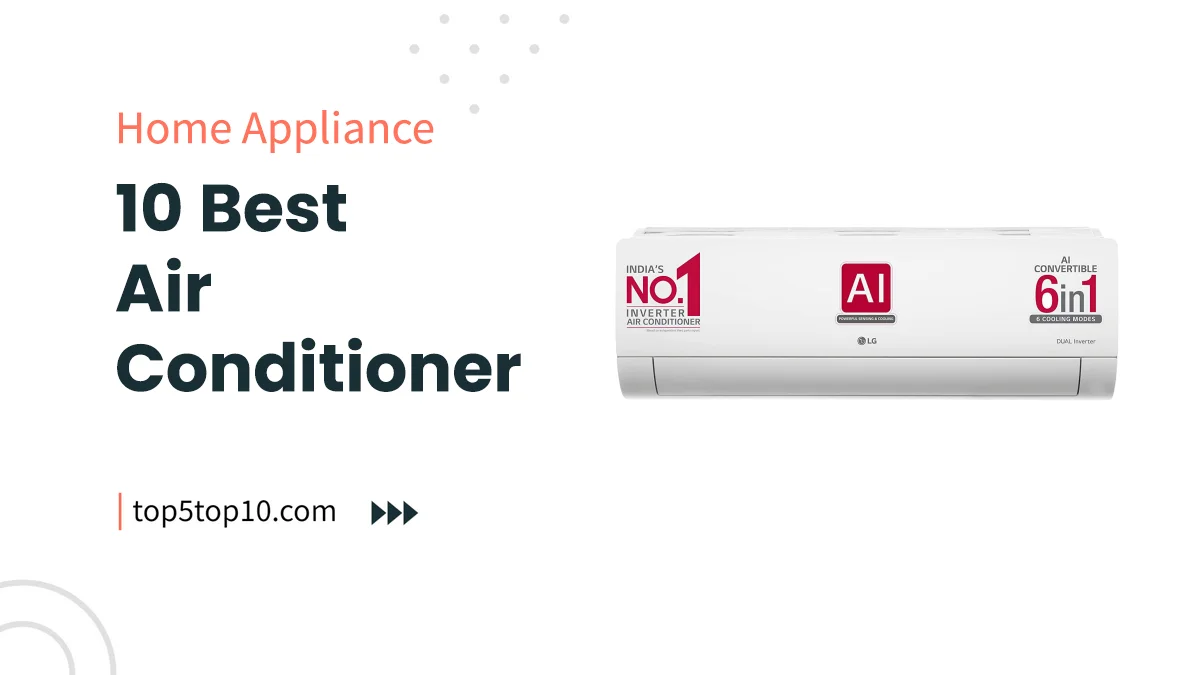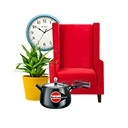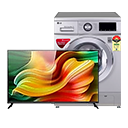
10 Best Air Conditioner 2023 – An air conditioner is a system designed to cool and dehumidify the air inside a building or vehicle.
It works by circulating the air through a cooling system that uses refrigerant and other components to reduce the temperature of the air.
This cooled air is then circulated back into the building or vehicle, providing a comfortable environment for occupants.
Air conditioners come in many different types, such as central air conditioning systems, split ACs, window units, and portable ACs.
They can also be part of an HVAC (Heating, Ventilation and Air Conditioning) system that provides heating and cooling throughout a home or commercial building.
Understanding how an air conditioner works can help you make informed decisions about which type of AC is best for your needs.
Air conditioners are an essential part of life in many parts of the world. With a variety of types and brands available, it can be difficult to determine which type is best for your needs.
From portable air conditioners to window units and central air units, each has its own advantages and disadvantages.
It’s important to understand the differences between these types of air conditioners so that you can make an informed decision when selecting one for your home or business.
In this article, we will discuss the different types of air conditioners available and which one is best for you.
We will also cover window ac units, ductless mini-split systems, and popular central air unit brands so that you can make an educated decision when choosing the right system for your space.
Air conditioning is an important part of any home or office. But before you can enjoy the cool air, you need to make sure that your AC unit is sized correctly.
To do this, you need to calculate the cooling capacity of your AC unit. This can be done by using a BTU calculator to determine how many BTUs (British Thermal Units) your air conditioner needs to cool a specific room or area.
With this information, you can then determine the correct size of your AC unit and ensure that it will provide enough cooling power for your space.
Keeping your home cool during the summer months can be a challenge, but with an energy-efficient air conditioner, you can save money and improve the comfort of your home.
Energy Star certified AC units are designed to help reduce energy consumption while providing efficient cooling.
With the best cooling efficiency rating AC unit, you can ensure that your home is both comfortable and energy-efficient.
Investing in an energy-efficient air conditioner is a great way to improve your home’s efficiency and save money on your utility bills.
Contents
- 10 Best Air Conditioner Price List 2023
- 10 Best Air Conditioner in India 2023
- 1. Voltas Inverter Split Air Conditioner (1.5 Ton, 5 Star)
- 2. LG AI DUAL Inverter Split AC (1.5 Ton, 5 Star)
- 3. Daikin Fixed Speed Split AC (0.8 Ton, 3 Star)
- 4. Daikin Fixed Speed Split AC (1.5 Ton, 3 Star)
- 5. Daikin Inverter Split AC (1.5 Ton, 5 Star)
- 6. LG DUAL Inverter Wi-Fi Window AC (1 Ton, 5 Star)
- 7. Panasonic Wi-Fi Inverter Split Air Conditioner (1 Ton, 5 Star)
- 8. LG AI DUAL Inverter Split AC (1 Ton, 4 Star)
- 9. Panasonic Wi-Fi Inverter Smart Split AC (1.5 Ton, 5 Star)
- 10. Blue Star Fixed Speed Window AC (0.8 Ton, 4 Star)
- (1) How to Choose the Right Air Conditioner for Your Home
- (2) The Pros and Cons of Window vs. Portable Air Conditioners
- (3) 10 Tips for Keeping Your Air Conditioner Running Efficiently
- (4) Smart Air Conditioners: The Future of Home Cooling
- (5) Ductless Mini-Split Air Conditioners: Is It Right for You?
- (6) How to Install a Window Air Conditioner: A Step-by-Step Guide
- (7) Air Conditioner Maintenance: How to Clean and Replace Filters
- (8) The Benefits of Having a Central Air Conditioning System in Your Home
- 10 Best Air Conditioner Offer List 2023
- Air Conditioner FAQs
10 Best Air Conditioner Price List 2023
| S.No. | Air Conditioner | Price |
|---|---|---|
| 1. | Voltas Inverter Split Air Conditioner (1.5 Ton, 5 Star) | ₹41,900 |
| 2. | LG AI DUAL Inverter Split AC (1.5 Ton, 5 Star) | ₹45,490 |
| 3. | Daikin Fixed Speed Split AC (0.8 Ton, 3 Star) | ₹30,320 |
| 4. | Daikin Fixed Speed Split AC (1.5 Ton, 3 Star) | ₹38,890 |
| 5. | Daikin Inverter Split AC (1.5 Ton, 5 Star) | ₹45,490 |
| 6. | LG DUAL Inverter Wi-Fi Window AC (1 Ton, 5 Star) | ₹32,299 |
| 7. | Panasonic Wi-Fi Inverter Split Air Conditioner (1 Ton, 5 Star) | ₹34,999 |
| 8. | LG AI DUAL Inverter Split AC (1 Ton, 4 Star) | ₹44,990 |
| 9. | Panasonic Wi-Fi Inverter Smart Split AC (1.5 Ton, 5 Star) | ₹45,990 |
| 10. | Blue Star Fixed Speed Window AC (0.8 Ton, 4 Star) | ₹24,990 |
Recent Posts:
- Polk vs Sony Soundbars: Making the Right Choice
- Sonos vs Polk Soundbars: A Comprehensive Comparison
- Polk vs JBL Soundbars: A Comprehensive Comparison
- Polk vs Bose Soundbars: A Comprehensive Comparison
10 Best Air Conditioner in India 2023
1. Voltas Inverter Split Air Conditioner (1.5 Ton, 5 Star)
Brand: Voltas
Capacity: 1.5 Tons
Annual Energy Consumption: 5200 Watts
Noise Level: 46 dB
Installation Type: Split System
Voltage: 230 Volts
Wattage: 5200 Watts
Item Weight: 39 kg
Item Dimensions LxWxH: 99 x 31.5 x 24.2 Centimeters
Price: ₹38,999
Rating: 4.0/5
2. LG AI DUAL Inverter Split AC (1.5 Ton, 5 Star)
Copper Super Convertible 6-in-1 Cooling HD Filter with Anti-Virus Protection 2023 Model RS-Q19YNZE WhiteBrand: LG
Capacity: 1.5 Tons
Annual Energy Consumption: 685.26 Kilowatt Hours Per Year
Noise Level: 31 dB
Installation Type: Split System
Voltage: 230 Volts
Wattage: 1130 Watts
Item Weight: 41 kg
Item Dimensions LxWxH: 21 x 99.8 x 34.5 Centimeters
Price: ₹46,490
Rating: 4.2/5
3. Daikin Fixed Speed Split AC (0.8 Ton, 3 Star)
Copper PM 2.5 Filter 2022 Model FTL28U WhiteBrand: Daikin
Capacity: 0.8 Tons
Annual Energy Consumption: 548.84 Kilowatt Hours Per Year
Noise Level: 32 dB
Installation Type: Split System
Voltage: 230 Volts
Wattage: 709 Watts
Item Weight: 36 kg
Item Dimensions LxWxH: 80 x 22.9 x 29.8 Centimeters
Price: ₹30,390
Rating: 4.2/5
More Info : Daikin official website. Click here!
4. Daikin Fixed Speed Split AC (1.5 Ton, 3 Star)
Copper PM 2.5 Filter 2022 Model FTL50U WhiteBrand: Daikin
Capacity: 1.5 Tons
Annual Energy Consumption: 989.31 Kilowatt Hours Per Year
Noise Level: 38 dB
Installation Type: Split System
Voltage: 230 Volts
Wattage: 1278 Watts
Item Weight: 51 kg 500 g
Item Dimensions LxWxH: 88.5 x 22.9 x 29.8 Centimeters
Price: ₹38,030
Rating: 4.1/5
5. Daikin Inverter Split AC (1.5 Ton, 5 Star)
Copper PM 2.5 Filter 2022 Model MTKM50U WhiteBrand: Daikin
Capacity: 1.5 Tons
Annual Energy Consumption: 785.67 Kilowatt Hours Per Year
Noise Level: 38 dB
Installation Type: Split System
Voltage: 230 Volts
Wattage: 1325 Watts
Item Weight: 44 kg
Item Dimensions LxWxH: 88.5 x 22.9 x 29.8 Centimeters
Price: ₹44,490
Rating: 4.1/5
6. LG DUAL Inverter Wi-Fi Window AC (1 Ton, 5 Star)
Copper Convertible 4-in-1 cooling PW-Q12WUZA 2022 Model HD FilterWhite
Brand: LG
Capacity: 1 Tons
Annual Energy Consumption: 672.46 Kilowatt Hours Per Year
Noise Level: 44 dB
Installation Type: Window
Voltage: 230 Volts
Wattage: 1050 Watts
Item Weight: 40 kg
Item Dimensions LxWxH: 60 x 63 x 38 Centimeters
Price: ₹32,369
Rating: 4.2/5
7. Panasonic Wi-Fi Inverter Split Air Conditioner (1 Ton, 5 Star)
Copper Shield Blu Anti-Corrosion Technology PM 2.5 Air Purification 2022 Model CS/CU-NU12XKYWA WhiteBrand: Panasonic
Capacity: 1 Tons
Annual Energy Consumption: 589.14 Kilowatt Hours
Noise Level: 37 dB
Installation Type: Split System
Voltage: 230 Volts
Wattage: 990 Watts
Item Weight: 31 kg
Item Dimensions LxWxH: 87 x 20.4 x 29 Centimeters
Price: ₹35,999
Rating: 4.3/5
8. LG AI DUAL Inverter Split AC (1 Ton, 4 Star)
Copper Super Convertible 6-in-1 Cooling HD Filter with Anti Virus protection 2023 Model RS-Q13JNYE WhiteBrand: LG
Capacity: 1 Tons
Annual Energy Consumption: 571.99 Kilowatt Hours Per Year
Noise Level: 21 dB
Installation Type: Split System
Voltage: 230 Volts
Wattage: 938 Watts
Item Weight: 32 kg 100 g
Item Dimensions LxWxH: 18.9 x 83.7 x 30.8 Centimeters
Price: ₹34,490
Rating: 4.0/5
9. Panasonic Wi-Fi Inverter Smart Split AC (1.5 Ton, 5 Star)
Copper Condenser
7 in 1 Convertible with additional AI Mode
4 Way Swing
PM 0.1 Air Purification Filter
CS/CU-NU18YKY5W
2023 Model
White
Brand: Panasonic
Capacity: 1.5 Tons
Annual Energy Consumption: 774.19 Kilowatt Hours
Noise Level: 39 dB
Installation Type: Split System
Voltage: 230 Volts
Wattage: 1290 Watts
Item Weight: 37 kg
Item Dimensions LxWxH: 23.5 x 107 x 29 Centimeters
Price: ₹45,990
Rating: 4.3/5
10. Blue Star Fixed Speed Window AC (0.8 Ton, 4 Star)
Copper Turbo Cool Humidity Control Fan Modes-Auto/High/Medium/Low Hydrophilic Blue Fins Dust Filter Self-Diagnosis 2023 Model WFA409GL WhiteBrand: Blue Star
Capacity: 0.8 Tons
Annual Energy Consumption: 648.7 Kilowatt Hours
Noise Level: 48 dB
Installation Type: Window
Voltage: 240 Volts
Wattage: 838 Watts
Item Weight: 37 kg 500 g
Item Dimensions LxWxH: 52.5 x 60 x 38.5 Centimeters
Price: ₹24,990
Rating: 4.1/5
Disclaimer: Prices and ratings mentioned in this article are approximate and subject to change. Be sure to check the latest prices and reviews before making a purchase.
(1) How to Choose the Right Air Conditioner for Your Home
Choosing the right air conditioner for your home can be a daunting task, but with some basic knowledge and understanding of your specific needs, it can be much easier.
Here are some factors to consider when choosing the right air conditioner for your home:
- Room Size: The size of your room is a key factor in choosing the right air conditioner. You should measure the room’s square footage, and then consult an air conditioning sizing chart to determine the BTUs (British Thermal Units) required to cool the space effectively. A unit that is too small won’t effectively cool the room, while a unit that is too large will waste energy and lead to higher bills.
- Energy Efficiency: Look for an air conditioner with a high SEER (Seasonal Energy Efficiency Ratio) rating, which measures how efficiently the unit uses energy to cool your home. The higher the SEER rating, the more energy-efficient the unit, which will help you save money on your energy bills.
- Noise Level: Check the decibel level of the air conditioner you are considering. If the unit is too loud, it can be disruptive to your daily activities and even disturb your sleep. Look for units that have a decibel level below 60 dB.
- Type of Air Conditioner: There are different types of air conditioners, including window units, portable units, ductless mini-split systems, and central air conditioning. Consider the pros and cons of each type and choose the one that fits your budget, room size, and specific needs.
- Brand and Warranty: Look for a reputable brand with a good warranty. A reputable brand will have a proven track record for reliability and performance, and a good warranty will give you peace of mind in case of any issues with the unit.
- Installation: Consider the cost and complexity of installation. Some types of air conditioners, such as central air conditioning, require professional installation, while others, such as window units, can be installed by homeowners with basic DIY skills.
By taking these factors into consideration, you can choose the right air conditioner for your home, ensuring comfortable temperatures and energy efficiency all year round.
(2) The Pros and Cons of Window vs. Portable Air Conditioners
To choose the right air conditioner for your home, consider the following factors:
- Size: The size of the air conditioner is determined by the BTUs (British Thermal Units) it produces. A small room requires an air conditioner with fewer BTUs, while a large room or open space requires an air conditioner with more BTUs.
- Energy Efficiency: An energy-efficient air conditioner will save you money on your electricity bill. Look for models with high SEER (Seasonal Energy Efficiency Ratio) ratings.
- Type: There are several types of air conditioners, including window units, portable units, split systems, and central air conditioning. Choose the type that best suits your needs.
- Noise Level: If you plan to install the air conditioner in a bedroom or living room, choose a unit with a low noise level to avoid disturbance.
- Price: Set a budget for your air conditioner purchase, and look for models that fit within that budget.
- Brand Reputation: Choose a reputable brand with good customer service and a history of producing reliable air conditioners.
- Additional Features: Consider additional features such as remote control, programmable thermostat, air filters, and dehumidifiers that can improve the air quality in your home.
By considering these factors, you can select the right air conditioner for your home that will keep you comfortable and save you money in the long run.
(3) 10 Tips for Keeping Your Air Conditioner Running Efficiently
Window Air Conditioners Pros:
- Typically more affordable than portable models.
- More energy efficient than portable models.
- Easy to install and uninstall, can be stored during the off-season.
- Usually more powerful than portable models, making them ideal for larger rooms or open floor plans.
- Can be more aesthetically pleasing than portable models since they don’t take up floor space.
Window Air Conditioners Cons:
- Requires a window or similar opening to operate.
- Limited mobility since they must be installed in a fixed location.
- Can be noisy, particularly when the compressor turns on and off.
- May not be suitable for all window sizes or types, requiring additional modification or installation costs.
- Some models may block the view or obstruct natural light.
Portable Air Conditioners Pros:
- Easy to move from room to room, no installation required.
- Doesn’t require a window or similar opening to operate.
- Can be used as a heater, dehumidifier, or fan in addition to air conditioning.
- Often quieter than window models since the compressor is located outside the room.
- Some models include smart features like WiFi connectivity and voice control.
Portable Air Conditioners Cons:
- More expensive than window models.
- Less energy efficient than window models, resulting in higher electricity bills.
- May take up valuable floor space in the room.
- Less powerful than window models, may not be suitable for larger rooms or open floor plans.
- Typically heavier and bulkier than window models, making them more difficult to move up stairs or store during the off-season.
(4) Smart Air Conditioners: The Future of Home Cooling
Smart air conditioners are the future of home cooling as they offer advanced features that make it easier to control and manage the temperature of your home.
They are Wi-Fi-enabled and can be controlled through a smartphone app, smart speakers, or voice commands.
Smart air conditioners also have sensors that can adjust the temperature based on the number of people in a room, the time of day, and the outdoor temperature.
Some models can even learn your daily routines and adjust the temperature accordingly, making your home more energy-efficient.
With smart air conditioners, you can save money on your energy bills and have a more comfortable living space.
(5) Ductless Mini-Split Air Conditioners: Is It Right for You?
Ductless mini-split air conditioners are a good option if you want to cool a specific area or room in your home without having to install ductwork.
They consist of an outdoor compressor and one or more indoor air-handling units that are mounted on the wall or ceiling.
One of the main advantages of ductless mini-split air conditioners is their energy efficiency. They can be more efficient than central air conditioning systems because they don’t lose cooled air through ductwork.
They also allow you to control the temperature in specific areas of your home, so you don’t have to cool the whole house if you don’t need to.
However, ductless mini-split air conditioners can be more expensive to install than other types of air conditioning systems, and they may not be the best option if you want to cool your entire home.
It’s important to properly size your mini-split system to ensure it can adequately cool the space you want it to.
Additionally, you may need to hire a professional to install the system, which can add to the overall cost.
(6) How to Install a Window Air Conditioner: A Step-by-Step Guide
Here is a step-by-step guide on how to install a window air conditioner:
- Choose a suitable location: Find a suitable location for your air conditioner that is near an electrical outlet and has enough space to accommodate the unit.
- Measure the window: Measure the window and make sure the air conditioner fits perfectly. Most window air conditioners are designed to fit in double-hung windows.
- Prepare the window: Remove any obstacles from the window, such as curtains or blinds. Clean the window sill and remove any debris or dirt.
- Install the mounting brackets: Most window air conditioners come with mounting brackets. Attach the brackets to the window sill using screws and a drill.
- Insert the air conditioner: Carefully place the air conditioner into the window and onto the brackets. Make sure the unit is level and centered in the window.
- Secure the air conditioner: Lower the top window sash onto the air conditioner and slide the side window panels to fit snugly against the unit. Secure the air conditioner to the brackets using screws.
- Seal the gaps: Use weather-stripping or foam insulation to seal any gaps between the air conditioner and the window frame. This will help prevent hot air from entering the room.
- Plug in the air conditioner: Plug the air conditioner into an electrical outlet and turn it on to test if it is working properly.
- Adjust the settings: Adjust the settings on your air conditioner according to your preferences. You can adjust the temperature, fan speed, and other features.
- Enjoy the cool air: Enjoy the cool air and make sure to clean and maintain your air conditioner regularly to keep it working efficiently.
(7) Air Conditioner Maintenance: How to Clean and Replace Filters
Air conditioner maintenance is important to ensure that your unit is running efficiently and effectively.
One of the most important aspects of maintenance is cleaning and replacing your filters. Here’s how to do it:
- Turn off the power: Before you begin, turn off the power to your air conditioner.
- Locate the filter: Most air conditioners have a filter located behind the front panel of the unit. Consult your owner’s manual for the specific location.
- Remove the filter: Remove the front panel of the unit and gently remove the filter.
- Clean the filter: If the filter is made of reusable material, you can clean it by gently rinsing it with water or using a vacuum to remove debris. Be sure to allow the filter to dry completely before replacing it.
- Replace the filter: If the filter is disposable, simply replace it with a new one. Make sure the filter is installed correctly and securely.
- Clean the unit: While you have the front panel off, it’s a good idea to clean the inside of the unit with a soft cloth or brush.
- Replace the front panel: Once the filter is cleaned or replaced and the unit is clean, replace the front panel and turn the power back on.
It’s recommended that you clean or replace your air conditioner filters at least once every three months, or more frequently if you have pets or if the unit is running constantly.
Regular maintenance will help ensure that your air conditioner is working efficiently and will extend the life of your unit.
(8) The Benefits of Having a Central Air Conditioning System in Your Home
A central air conditioning system offers several benefits for homeowners, including:
- Consistent Temperature Control: A central AC system can maintain a consistent temperature throughout your home, ensuring that every room is cool and comfortable.
- Improved Air Quality: Central air conditioners have built-in air filters that remove pollutants, allergens, and other contaminants from the air, resulting in better indoor air quality.
- Energy Efficiency: Central air conditioning systems are more energy-efficient than portable or window units, which can help reduce your monthly utility bills.
- Increased Home Value: A central AC system is considered a valuable upgrade, which can increase the resale value of your home.
- Convenience: A central air conditioning system is easy to use and can be controlled with a thermostat or a mobile app. It also eliminates the need for multiple AC units in different rooms.
- Quieter Operation: Central air conditioners operate quietly, unlike noisy portable or window units, which can be disruptive and annoying.
Overall, a central air conditioning system provides greater comfort, convenience, and energy efficiency, making it a worthwhile investment for homeowners.
10 Best Air Conditioner Offer List 2023
| # | Preview | Product | Rating | Price | |
|---|---|---|---|---|---|
| 1 |

|
Daikin 0.8 Ton 3 Star, Fixed Speed Split AC (Copper, PM... | 2,793 Reviews | ₹ 37,400 ₹ 30,700 | Buy on Amazon |
| 2 |

|
Carrier 1.5 Ton 5 Star AI Flexicool Inverter Split AC... | 1,641 Reviews | ₹ 52,000 ₹ 51,000 | Buy on Amazon |
| 3 |

|
Samsung 1.5 Ton 3 Star Wi-fi Enabled, Inverter Split AC... | Buy on Amazon | ||
| 4 |

|
Carrier 1.5 Ton 3 Star AI Flexicool Inverter Split AC... | 2,168 Reviews | ₹ 42,000 ₹ 41,000 | Buy on Amazon |
| 5 |

|
Haier 1.5 Ton 5 Star Triple Inverter Split AC (Copper,... | ₹ 74,000 ₹ 46,990 | Buy on Amazon | |
| 6 |

|
Daikin 1 Ton 3 Star Inverter Split AC (Copper, PM 2.5... | ₹ 54,300 ₹ 44,899 | Buy on Amazon | |
| 7 |

|
Lloyd 1.5 Ton 3 Star Inverter Split AC (5 in 1... | ₹ 49,900 ₹ 33,500 | Buy on Amazon | |
| 8 |

|
Voltas 1 Ton 3 Star, Inverter Split AC(Copper, 4-in-1... | ₹ 54,990 ₹ 31,550 | Buy on Amazon | |
| 9 |

|
Carrier 1 Ton 5 Star AI Flexicool Inverter Split AC... | ₹ 84,990 ₹ 37,990 | Buy on Amazon | |
| 10 |

|
Daikin 1.5 Ton 5 Star Inverter Split AC (Copper, PM 2.5... | ₹ 73,200 ₹ 56,870 | Buy on Amazon |
Air Conditioner FAQs
What is an air conditioner?
An air conditioner is a device used for controlling the temperature, humidity, and air quality of an enclosed space.
What are the different types of air conditioners?
Air conditioners can be classified based on the type of system, such as central air conditioners, split-system air conditioners, window air conditioners, and portable air conditioners.
What are the factors to consider when buying an air conditioner?
When buying an air conditioner, consider factors such as the size of the room, the energy efficiency of the unit, the type of system, the noise level, and the cost.
How does an air conditioner work?
An air conditioner works by removing heat from the air inside a room and expelling it outside.
This is achieved through the use of a refrigerant that is cooled and then circulated through a series of coils, causing the air inside the room to be cooled.
How do you maintain an air conditioner?
To maintain an air conditioner, it is important to clean the filters regularly and have the unit serviced by a professional at least once a year.
This will help to ensure that the air conditioner is functioning efficiently and effectively.
How long does an air conditioner last?
The lifespan of an air conditioner will depend on various factors such as the type of unit, the frequency of use, and the level of maintenance.
On average, an air conditioner should last between 10 and 15 years.
How much does it cost to run an air conditioner?
The cost to run an air conditioner will depend on various factors such as the size of the unit, the frequency of use, and the local cost of electricity.
On average, the cost to run an air conditioner for a typical 8-hour day can range from a few dollars to over $20, depending on these factors.
Can an air conditioner be used in the winter?
Yes, an air conditioner can be used in the winter to help regulate the temperature and humidity inside a room. This is often referred to as 'reverse cycle air conditioning'.
|
Recent Posts
- Polk vs Sony Soundbars: Making the Right Choice
- Sonos vs Polk Soundbars: A Comprehensive Comparison
- Polk vs JBL Soundbars: A Comprehensive Comparison
- Polk vs Bose Soundbars: A Comprehensive Comparison
- JBL vs Bose Soundbars: A Comprehensive Comparison
Related Tags
AC Unit, Room Air Conditioner, Central Air Conditioner, Portable Air Conditioner, Window Air Conditioner, Split System Air Conditioner, Ductless Air Conditioner, Wall-Mounted Air Conditioner, Smart Air Conditioner, Energy Efficient Air Conditioner, Inverter Air Conditioner, Climate Control, HVAC, Home Cooling, Cooling Appliance, Room Comfort, Air Quality, Air Filtration, Home Appliance, Home Comfort.
Last update on 2024-04-28 at 01:17 / Affiliate links / Images from Amazon Product Advertising API



















